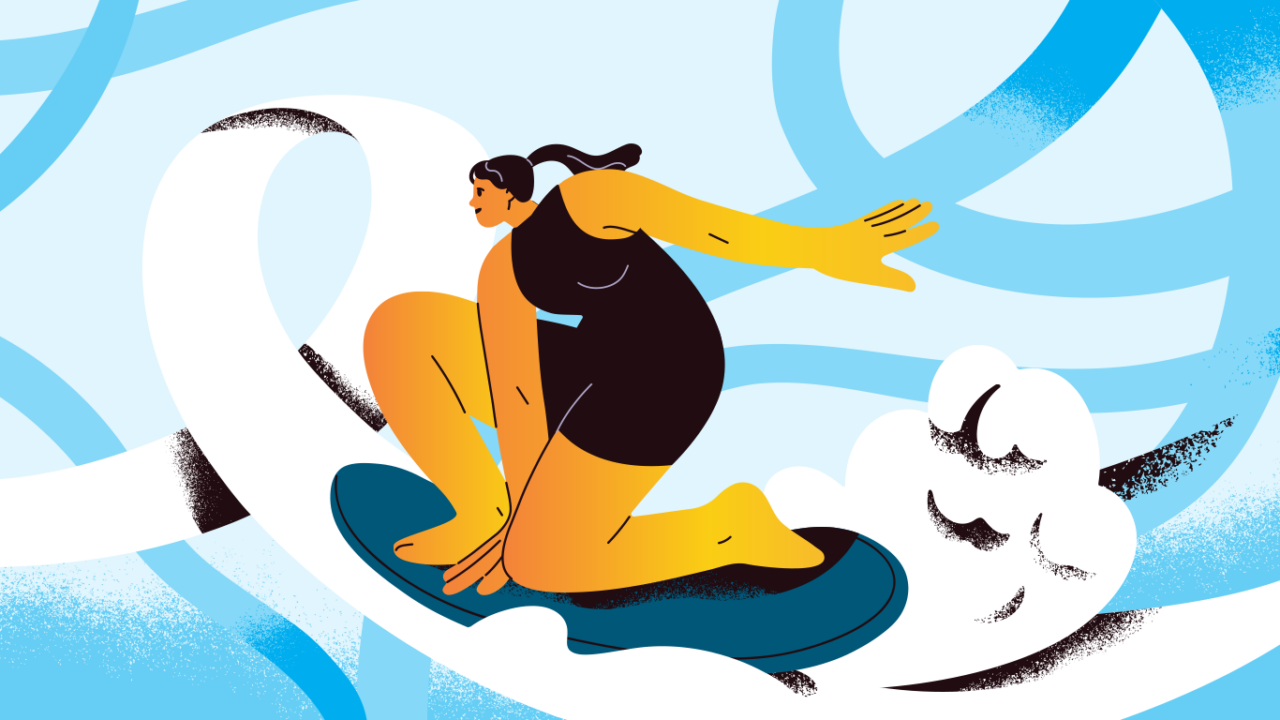Feature
The Unconventional Path to Success
North Park University alumni turn their diverse studies into dynamic careers.
By Jared Scott Tesler

North Park University’s rich tradition of embracing the value of an education spanning many disciplines results in all students taking a significant number of courses that address the breadth of human engagement with the natural world, arts, culture, and Christian faith. It affords them a range of knowledge and the ability to explore their different interests within the context of their college career.
While many graduates go on to work in fields related to their majors, North Park’s liberal arts education also produces alumni who display resilience and courage in finding career success on unconventional paths.
Martha Shimkin BA ’84, for instance, studied German, Swedish, and business administration before pursuing a long and impactful career with the United States Environmental Protection Agency.
Joanna Kanakis BA ’06—Distinguished Young Alumni Award recipient in 2016 who double-majored in philosophy and French—currently serves as LPL Financial’s senior vice president of institution business development and head of product manufacturing.
LPL Financial is the leading investment and business solutions provider for independent financial advisors nationwide, an organization one may think is limited to those with business degrees.

My years at North Park created lively friendships and the ability to relate to others from all backgrounds. This was valuable, as the organ was among the fans behind home plate. With those fans, I formed lasting friendships and welcomed their constant interaction over my 41-year career there.
—NANCY (SODERBERG) FAUST
Similarly, Nancy (Soderberg) Faust BA ’69, an elementary education major, never taught a day in her life. Instead, she was called to music. “Thanks to perfect pitch,” she recalled, “I could play anything I heard.”
While in college, Faust occasionally filled in for her mother, a professional musician, at various engagements. One such event was a 1970 sports banquet attended by General Manager Stu Holcomb of the Chicago White Sox. Upon hearing Faust play, Holcomb hired her as the team’s first female home field organist.
“My years at North Park created lively friendships and the ability to relate to others from all backgrounds,” she said. “This was valuable, as the organ was among the fans behind home plate. With those fans, I formed lasting friendships and welcomed their constant interaction over my 41-year career there.”
Faust’s connections were so strong that the White Sox invited her back to perform six Sunday games during the 2025 season after her nearly 15-year hiatus.
Though Audrey Borden BA ’22, who majored in sociology, had originally intended to become a lawyer, she quickly set her sights on entrepreneurship while remaining interested in everything a liberal arts education offers. Rather than changing majors and loading up on business classes, Borden continued along her educational path, taking courses that brought her knowledge and joy while beginning a job as a cafe manager.
“This helped me learn the practical skills I needed to open a business—making drinks and food, customer service, working with a team of people—while taking classes that taught me about our world,” she said.
In August 2023, Borden cofounded—with Michelle Gonzalez BA ’21, MA ’22—October Cafe, a local coffeehouse serving fall-inspired beverages, pastries, and small plates, including vegan options.
Like Borden, Gonzalez embraced North Park’s liberal arts education, majoring in early childhood education and returning for her master’s degree in education.
Borden said, “Being a small business owner is one of the best and hardest decisions I’ve made. Every day, you have to work hard and give your all, constantly putting yourself and your business in the limelight. It’s so exciting, terrifying, and worth it to have something that’s your own.”
Jamal Bakr MA ’22 has embraced and exemplified resilience not only through his academic and career paths but also through his faith. An inaugural cohort member of North Park Theological Seminary’s School of Restorative Arts, Bakr earned his four-year Master of Arts in Christian Ministry as a resident scholar at Stateville Correctional Center.
During the program, he took the course “Ministry, Identity, and Practice” with Lecturer Pastor Philip “Phil” Jackson.
“That class introduced me to the versatility of my degree and the possibility of its role in my calling as a violence preventionist and mentor,” Bakr said. “I started considering doing preemptive deterrence—a concept I learned through my coursework—in the free world.”
Less than a year after his graduation, Bakr was resentenced and given an opportunity for early release thanks to a youth offender parole hearing.

If not for my faith, receiving a prison sentence that I knew I wouldn’t survive would have undoubtedly destroyed any potential I had to discover purpose. I saw my freedom because my faith allowed me to see what my eyes could not and gave me the bravery and audacity to move toward it.
—JAMAL BAKR
Following his calling, Bakr researched community-based violence intervention programs in Chicago and discovered the Firehouse Community Arts Center. The nonprofit organization offers year-round, multidisciplinary cultural arts programming, mentorship, and leadership and workforce development centered around preventing and interrupting violence, particularly among youth and young adults in Chicago’s North Lawndale neighborhood.
Its founder and chief executive officer? Pastor Phil Jackson. Bakr reached out, and Jackson hired him on the spot. “Most people run from conflict. Seldom do they run toward it. And if they do, it’s to record it with their phones. Even more rare are people who try to intervene and prevent conflict,” Bakr said. “I was one of the few taking this approach to conflict while on the inside, and it was only natural for me to continue this calling—for life and a career—on the outside.”
He continued, “If not for my faith, receiving a prison sentence that I knew I wouldn’t survive would have undoubtedly destroyed any potential I had to discover purpose. I saw my freedom because my faith allowed me to see what my eyes could not and gave me the bravery and audacity to move toward it.”
SHARE WITH FRIENDS